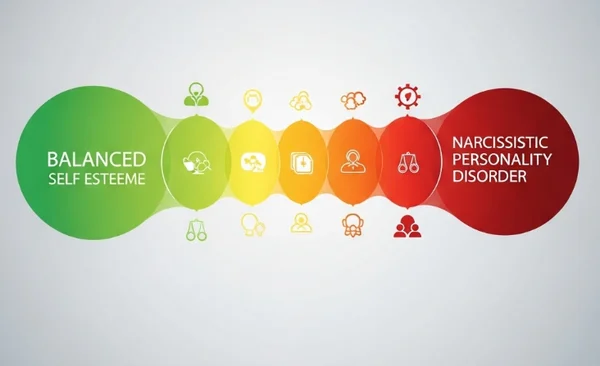ฉันคิดว่าฉันมีแนวโน้มหลงตัวเอง: การตระหนักรู้ในตนเองและการเติบโต
June 29, 2025 | By Rowan Thorne
คุณเคยสงสัยไหมว่า "ฉันมีลักษณะของโรคหลงตัวเองหรือไม่?" การตั้งคำถามนี้ต้องใช้ความกล้าหาญอย่างแท้จริงและถือเป็นก้าวสำคัญสู่การสำรวจตนเอง เป็นเรื่องง่ายที่จะมองข้ามพฤติกรรมบางอย่างหรือตีตราตัวเองจากการสังเกตการณ์เพียงชั่วครู่ แต่การเติบโตที่แท้จริงเริ่มต้นด้วยการสำรวจตนเองอย่างตรงไปตรงมา คู่มือนี้จะสำรวจลักษณะอาการหลงตัวเองอย่างเห็นอกเห็นใจ ว่าสิ่งเหล่านี้อาจส่งผลกระทบต่อชีวิตของคุณอย่างไร และขั้นตอนปฏิบัติที่คุณสามารถทำได้เพื่อการตระหนักรู้ในตนเอง การเติบโตส่วนบุคคล และความสัมพันธ์ที่ดีต่อสุขภาพ การเข้าใจตนเองเป็นก้าวแรก การลงมือทำคือการเดินทาง สำหรับจุดเริ่มต้นที่เป็นประโยชน์ ลองพิจารณา การประเมินออนไลน์ ฟรี

การจดจำลักษณะอาการหลงตัวเองในตนเอง
หลายคนใช้คำว่า "คนหลงตัวเอง" อย่างไม่เจาะจง บ่อยครั้งเพื่ออธิบายคนที่ดูหมกมุ่นอยู่กับตัวเองหรือหยิ่งยโส อย่างไรก็ตาม การทำความเข้าใจลักษณะเฉพาะของการหลงตัวเองที่แท้จริงนั้นลึกซึ้งกว่ารูปลักษณ์ภายนอกมาก มันเกี่ยวกับการจดจำรูปแบบพื้นฐานที่อาจส่งผลกระทบต่อโลกภายในและการปฏิสัมพันธ์ของคุณกับผู้อื่น การเดินทางครั้งนี้ต้องการการประเมินตนเองอย่างตรงไปตรงมา ซึ่งอาจเป็นเรื่องท้าทาย แต่มอบผลตอบแทนที่คุ้มค่าอย่างยิ่ง
นอกเหนือจากภาพลักษณ์แบบเหมารวม: การทำความเข้าใจสเปกตรัมของการหลงตัวเอง
เป็นสิ่งสำคัญอย่างยิ่งที่จะต้องเข้าใจว่าความมั่นใจในตนเองนั้นเป็นเรื่องที่ดี ทุกคนมีระดับความภาคภูมิใจในตนเองและความทะเยอทะยานที่ดีต่อสุขภาพ อย่างไรก็ตาม การหลงตัวเองนั้นมีอยู่หลายระดับ ด้านหนึ่งคือลักษณะที่อาจปรากฏขึ้นเป็นครั้งคราวในบางคนโดยไม่มีผลกระทบที่สำคัญ อีกด้านหนึ่งคือโรคบุคลิกภาพหลงตัวเอง (NPD) ซึ่งเป็นการวินิจฉัยทางคลินิกโดยผู้เชี่ยวชาญด้านสุขภาพจิต ความแตกต่างที่สำคัญอยู่ที่ความไม่ยืดหยุ่น การครอบคลุมอย่างกว้างขวาง และระดับของความทุกข์หรือความบกพร่องที่เกิดขึ้น ตัวอย่างเช่น การได้รับคำชื่นชมเป็นเรื่องปกติ การเรียกร้องอย่างต่อเนื่องและมีปฏิกิริยาตอบสนองที่ไม่ดีหากไม่ได้รับ อาจบ่งบอกถึงแนวโน้มที่รุนแรงกว่า ความแตกต่างระหว่างการหลงตัวเองและ NPD คืออะไร? มันคือรูปแบบที่สอดคล้องกันของความรู้สึกยิ่งใหญ่ ความต้องการคำชื่นชม และการขาดความเห็นอกเห็นใจซึ่งบั่นทอนด้านต่างๆ ของชีวิตอย่างมีนัยสำคัญ
สัญญาณทั่วไปของลักษณะอาการหลงตัวเองในพฤติกรรม
ฉันจะรู้ได้อย่างไรว่าฉันมีลักษณะอาการหลงตัวเองหรือไม่? การจดจำลักษณะเหล่านี้ในตนเองเกี่ยวข้องกับการมองให้ไกลกว่าสิ่งที่เห็นได้ชัด และพิจารณาว่าพฤติกรรมของคุณส่งผลกระทบต่อผู้อื่นและความเป็นอยู่ที่ดีของคุณเองอย่างไร ลักษณะอาการหลงตัวเอง ทั่วไปอาจรวมถึงความรู้สึกที่สำคัญในตนเองที่เพิ่มขึ้น ความต้องการคำชื่นชมอย่างแพร่หลาย และความเชื่อในความพิเศษหรือความเหนือกว่าของตนเอง คุณอาจพบว่าตนเองมักจะจินตนาการถึงความสำเร็จ อำนาจ หรือความรักในอุดมคติอย่างไม่จำกัด อาจมีความรู้สึกว่าตนเองมีสิทธิ์พิเศษ คาดหวังการปฏิบัติดูแลเป็นพิเศษหรือการปฏิบัติตามโดยอัตโนมัติจากผู้อื่น การขาดความเห็นอกเห็นใจเป็นอีกสัญญาณหนึ่ง ทำให้ยากที่จะจดจำหรือระบุความรู้สึกและความต้องการของผู้อื่น การหาประโยชน์จากผู้อื่นเพื่อผลประโยชน์ส่วนตน การแสดงพฤติกรรมที่หยิ่งยโส หรือการอิจฉาผู้อื่น (หรือเชื่อว่าผู้อื่นอิจฉาคุณ) ก็เป็นสิ่งที่พบเห็นได้ทั่วไปเช่นกัน พฤติกรรมเหล่านี้ไม่จำเป็นต้องคงที่ตลอดเวลา แต่ก่อตัวเป็นรูปแบบที่อาจกลายเป็นปัญหาเมื่อเวลาผ่านไป การทำ แบบทดสอบลักษณะอาการหลงตัวเอง สามารถช่วยให้คุณใคร่ครวญเกี่ยวกับลักษณะเหล่านี้ได้

การทำความเข้าใจผลกระทบของลักษณะอาการหลงตัวเองต่อชีวิตของคุณ
การยอมรับลักษณะอาการหลงตัวเองที่อาจเกิดขึ้นเป็นก้าวที่กล้าหาญ ก้าวต่อไปคือการทำความเข้าใจว่าลักษณะเหล่านี้แสดงออกอย่างไรและมีผลกระทบต่อชีวิตประจำวันของคุณอย่างไร โดยเฉพาะอย่างยิ่งต่อความสัมพันธ์และสภาวะภายในของคุณ ความเข้าใจนี้มีความสำคัญอย่างยิ่งต่อการเริ่มต้น การพัฒนาตนเอง ที่มีความหมาย
พฤติกรรมหลงตัวเองส่งผลต่อความสัมพันธ์ของคุณอย่างไร
ความสัมพันธ์มักเป็นที่แรกที่เห็นผลกระทบของลักษณะอาการหลงตัวเอง ในขณะที่เสน่ห์และความมั่นใจในตอนแรกอาจดึงดูดผู้คนเข้ามา แต่รูปแบบพื้นฐานสามารถนำไปสู่ความขัดแย้งที่สำคัญ คุณอาจสังเกตเห็นวงจรของการเริ่มต้นที่เข้มข้นและเร่าร้อน ตามมาด้วยช่วงเวลาของความผิดหวังหรือความขัดแย้ง ผู้ที่ใกล้ชิดกับคุณอาจแสดงความรู้สึกว่าไม่ได้รับการรับฟัง ถูกชักจูง หรือรู้สึกเหนื่อยล้าทางอารมณ์ แนวโน้มของคุณที่จะให้ความสำคัญกับความต้องการหรือความรู้สึกของตนเองเหนือกว่าผู้อื่นอาจสร้างความไม่สมดุลของอำนาจ เพื่อนหรือคู่ครองอาจถอนตัว รู้สึกว่าการมีส่วนร่วมของพวกเขาไม่ได้รับการประเมินค่า หรือเป็นเพียงส่วนขยายของอัตตาของคุณ การดิ้นรนเพื่อเชื่อมต่ออย่างแท้จริงในระดับอารมณ์อาจทำให้ทั้งสองฝ่ายรู้สึกโดดเดี่ยว แม้จะอยู่ด้วยกัน การเรียนรู้เพิ่มเติมเกี่ยวกับพลวัตเหล่านี้สามารถเป็นส่วนที่มีคุณค่าของ การประเมินลักษณะอาการหลงตัวเอง ของคุณ
ต้นทุนภายในของลักษณะอาการหลงตัวเอง: ความเหงา ความเปราะบาง และความไม่พอใจ
แม้ภายนอกจะดูแข็งแกร่งและมั่นใจ แต่บุคคลที่มีลักษณะอาการหลงตัวเองอย่างมากมักประสบกับความทุกข์ภายในอย่างมาก ความต้องการการยืนยันจากภายนอกอย่างต่อเนื่องอาจทำให้เหนื่อยล้า ความภาคภูมิใจในตนเองที่เปราะบางมักอยู่ใต้ภาพลักษณ์ที่ยิ่งใหญ่ ทำให้ไวต่อคำวิจารณ์อย่างยิ่ง สิ่งนี้สามารถกระตุ้นความโกรธ ความละอาย หรือความอัปยศอดสูอย่างรุนแรง แม้แต่การถูกตำหนิเล็กน้อย การรักษาภาพลักษณ์ที่สูงส่งต้องใช้ความพยายามอย่างมหาศาล ซึ่งนำไปสู่ความวิตกกังวลและความไม่พอใจเรื้อรัง แม้จะรายล้อมไปด้วยผู้ชื่นชม แต่ความรู้สึกโดดเดี่ยวอย่างลึกซึ้งก็ยังคงอยู่ เนื่องจากความใกล้ชิดทางอารมณ์ที่แท้จริงมักขาดหายไป การไม่สามารถไว้วางใจผู้อื่นอย่างเต็มที่หรือยอมรับความเปราะบางสามารถป้องกันความสัมพันธ์ที่ลึกซึ้งและมีความหมาย นำไปสู่ความไม่พอใจภายใน การทำความเข้าใจ ต้นทุนภายใน นี้มีความสำคัญอย่างยิ่งสำหรับทุกคนที่แสวงหาการเปลี่ยนแปลงที่แท้จริง

เส้นทางสู่การตระหนักรู้ในตนเองและการเติบโตจากลักษณะอาการหลงตัวเอง
หากคุณจดจำลักษณะเหล่านี้บางประการในตนเองได้และมีแรงจูงใจที่จะเปลี่ยนแปลง คุณก็อยู่บนเส้นทางที่ทรงพลังแล้ว การตระหนักรู้ในตนเองเกี่ยวกับลักษณะอาการหลงตัวเอง ไม่ใช่การตำหนิตนเอง แต่เป็นการทำความเข้าใจด้วยความเมตตาและความมุ่งมั่นในการเติบโต การเดินทางครั้งนี้ต้องการความทุ่มเทและความเต็มใจที่จะเผชิญหน้ากับความจริงที่ไม่สบายใจ
ขั้นตอนปฏิบัติเพื่อการสำรวจตนเองและการสร้างความเห็นอกเห็นใจ
เริ่มต้นด้วยการสำรวจตนเองอย่างสม่ำเสมอ การจดบันทึกสามารถเป็นเครื่องมืออันทรงพลังในการติดตามความคิด ความรู้สึก และพฤติกรรมของคุณ โดยเฉพาะอย่างยิ่งในการตอบสนองต่อคำวิจารณ์หรือการถูกตำหนิ ลองถามตัวเองว่า "ฉันรู้สึกอย่างไรในขณะนั้นจริงๆ?" หรือ "อีกฝ่ายน่าจะรู้สึกอย่างไร?" ฝึกฝน การสร้างความเห็นอกเห็นใจ ด้วยการรับฟังผู้อื่นอย่างตั้งใจ โดยไม่ต้องรีบตัดสินความคิดเห็นของพวกเขา ลองสวมบทบาทของพวกเขาและพิจารณาถึงมุมมองของพวกเขาอย่างแท้จริง การสวมบทบาทการสนทนาที่ท้าทายกับเพื่อนที่ไว้ใจหรือนักบำบัด สามารถช่วยให้คุณฝึกฝนรูปแบบการสื่อสารที่ดีต่อสุขภาพได้ การขอความคิดเห็นที่สร้างสรรค์จากคนที่คุณไว้วางใจ สามารถให้ข้อมูลเชิงลึกจากภายนอกเกี่ยวกับพฤติกรรมของคุณได้อย่างประเมินค่ามิได้ ช่วยให้คุณปรับปรุงการรับรู้ตนเอง
การพัฒนากลไกการรับมือและการสื่อสารที่ดีต่อสุขภาพ
การพัฒนากลไก การรับมือ ที่ดีต่อสุขภาพเป็นกุญแจสำคัญในการจัดการกับอารมณ์ที่ยากลำบาก โดยไม่ต้องหันไปใช้พฤติกรรมหลงตัวเอง แทนที่จะโกรธเคืองหรือถอนตัวเมื่อถูกวิจารณ์ ให้ฝึกหยุดและหายใจลึกๆ เรียนรู้ที่จะทนต่อความไม่สบายใจและความเปราะบาง สำรวจการฝึกสติเพื่อให้จิตใจจดจ่ออยู่กับปัจจุบัน มุ่งเน้นการสร้างความภาคภูมิใจในตนเองที่แท้จริงผ่านความสำเร็จและค่านิยม แทนที่จะอาศัยการยืนยันจากภายนอกเท่านั้น ในการสื่อสาร ให้ฝึกใช้ "ฉัน" เพื่อแสดงความรู้สึกและความต้องการของคุณโดยตรง แทนที่จะกล่าวโทษหรือเรียกร้อง มุ่งเน้นไปที่การทำงานร่วมกันและการประนีประนอม แทนที่จะต้อง "ชนะ" ทุกการโต้เถียง ความพยายามเล็กๆ น้อยๆ ที่สม่ำเสมอเหล่านี้มีส่วนสำคัญต่อ การเติบโตของลักษณะอาการหลงตัวเอง และปฏิสัมพันธ์ที่ดีต่อสุขภาพ
เมื่อใดและอย่างไรจึงจะขอความช่วยเหลือจากผู้เชี่ยวชาญเพื่อการเปลี่ยนแปลง
การยอมรับความจำเป็นในการเปลี่ยนแปลงเป็นก้าวที่ยิ่งใหญ่ แต่เส้นทางสู่ การเติบโตของลักษณะอาการหลงตัวเอง อาจซับซ้อน สำหรับหลายๆ คน การสนับสนุนจากผู้เชี่ยวชาญมีคุณค่าอย่างยิ่งในการนำทางเส้นทางนี้
ประโยชน์ของการบำบัดเพื่อจัดการกับลักษณะอาการหลงตัวเอง
การบำบัด โดยเฉพาะอย่างยิ่งการบำบัดแบบจิตพลวัต (psychodynamic therapy) หรือการบำบัดความคิดและพฤติกรรม (CBT) สามารถให้ประโยชน์อย่างลึกซึ้งสำหรับบุคคลที่จัดการกับลักษณะอาการหลงตัวเอง นักบำบัดที่มีทักษะสามารถให้พื้นที่ที่ปลอดภัยและไม่ตัดสินเพื่อสำรวจต้นกำเนิดของพฤติกรรมเหล่านี้ ซึ่งมักจะหยั่งรากจากประสบการณ์ในวัยเด็ก พวกเขาสามารถช่วยคุณระบุรูปแบบ ท้าทายความคิดที่บิดเบือน และพัฒนากลยุทธ์การรับมือที่ดีต่อสุขภาพ การบำบัดยังส่งเสริม การพัฒนาความเห็นอกเห็นใจ และช่วยให้คุณเข้าใจผลกระทบจากการกระทำของคุณต่อผู้อื่น เป็นสภาพแวดล้อมที่มีโครงสร้างสำหรับการเรียนรู้วิธีการใหม่ๆ ในการปฏิสัมพันธ์กับตนเองและโลก นำทางคุณไปสู่ความภาคภูมิใจในตนเองที่แท้จริงและความสัมพันธ์ที่เติมเต็มมากขึ้น การสำรวจ การบำบัดสำหรับลักษณะอาการหลงตัวเอง สามารถเป็นประสบการณ์ที่เปลี่ยนแปลงได้
การเอาชนะอุปสรรคต่อการเติบโต: การปฏิเสธและความเปราะบาง
อุปสรรคที่ใหญ่ที่สุดประการหนึ่งในการจัดการกับลักษณะอาการหลงตัวเองคือการเอาชนะการปฏิเสธและการยอมรับความเปราะบาง การยอมรับข้อบกพร่องหรือการรับทราบความผิดพลาดอาจรู้สึกถูกคุกคามอย่างลึกซึ้ง เนื่องจากเป็นการท้าทายภาพลักษณ์ตนเองในอุดมคติ การต่อต้านนี้มักมีต้นกำเนิดมาจากความไม่มั่นคงที่ซ่อนอยู่ นักบำบัดสามารถช่วยคุณเผชิญหน้ากับอุปสรรคเหล่านี้อย่างอ่อนโยน ส่งเสริมความรู้สึกปลอดภัยทางจิตวิทยาที่ความเปราะบางไม่รู้สึกน่ากลัว พวกเขาสามารถนำทางคุณผ่านความรู้สึกไม่สบายใจของการสำรวจตนเอง และช่วยคุณจัดการกับอารมณ์ที่ยากลำบากซึ่งเกิดขึ้นในระหว่างกระบวนการเติบโต จำไว้ว่าความแข็งแกร่งที่แท้จริงไม่ได้อยู่ที่ความสมบูรณ์แบบ แต่อยู่ที่ความกล้าหาญในการยอมรับความท้าทายของคุณและมุ่งมั่นที่จะปรับปรุงตนเอง

การโอบรับการเดินทางแห่งการเติบโตและความสัมพันธ์ที่ดีต่อสุขภาพของคุณ
การเริ่มต้นการเดินทางเพื่อตระหนักรู้ในตนเองเกี่ยวกับลักษณะอาการหลงตัวเอง เป็นความมุ่งมั่นที่สำคัญต่อความเป็นอยู่ที่ดีของคุณและคุณภาพของความสัมพันธ์ของคุณ มันเกี่ยวกับการก้าวข้ามการยืนยันเพียงผิวเผินไปสู่การบ่มเพาะคุณค่าในตนเองที่แท้จริงและความสัมพันธ์ที่มีความหมาย การจดจำพื้นที่สำหรับการเติบโตเป็นสัญญาณของความแข็งแกร่ง ไม่ใช่ความอ่อนแอ
โปรดจำไว้ว่าการสำรวจนี้เป็นกระบวนการ ไม่ใช่จุดหมายปลายทาง ทุกก้าวที่คุณก้าวไปสู่การตระหนักรู้ในตนเองที่มากขึ้นและพฤติกรรมที่ดีต่อสุขภาพยิ่งขึ้น จะก่อให้เกิดชีวิตที่สมบูรณ์และเป็นจริงยิ่งขึ้น หากคุณพร้อมที่จะก้าวแรกในการทำความเข้าใจตนเองให้ดีขึ้น เราขอเชิญชวนให้คุณ ค้นพบผลลัพธ์ของคุณ ด้วยเครื่องมือฟรีและเป็นความลับของเรา
เพื่อเริ่มต้น การประเมินลักษณะอาการหลงตัวเอง ที่ครอบคลุมของคุณ เยี่ยมชมเว็บไซต์ของเราวันนี้ และรับข้อมูลเชิงลึกอันมีค่าเกี่ยวกับบุคลิกภาพของคุณ เส้นทางสู่ความเข้าใจตนเองที่แท้จริงและความสัมพันธ์ที่ดีต่อสุขภาพกำลังรอคุณอยู่
คำถามที่พบบ่อยเกี่ยวกับลักษณะอาการหลงตัวเอง
คนที่มีลักษณะอาการหลงตัวเองสามารถเปลี่ยนแปลงได้อย่างแท้จริงหรือไม่?
ใช่ คนที่มีลักษณะอาการหลงตัวเองสามารถเปลี่ยนแปลงและเติบโตได้อย่างแน่นอน แม้ว่าโรคบุคลิกภาพหลงตัวเอง (NPD) จะเป็นสภาวะที่ซับซ้อนและมักจะมีความไม่ยืดหยุ่น แต่บุคคลที่มีลักษณะหรือรูปแบบของอาการหลงตัวเองสามารถเรียนรู้ที่จะจัดการกับพฤติกรรมของตนเอง สร้างความเห็นอกเห็นใจ และพัฒนากลไกการรับมือที่ดีต่อสุขภาพ การเปลี่ยนแปลงต้องการการตระหนักรู้ในตนเอง แรงจูงใจ และบ่อยครั้ง การสนับสนุนจากผู้เชี่ยวชาญผ่านการบำบัด ความมุ่งมั่นต่อ การพัฒนาตนเอง เป็นสิ่งสำคัญ
การมีลักษณะอาการหลงตัวเองเหมือนกับการมีโรคบุคลิกภาพหลงตัวเอง (NPD) หรือไม่?
ไม่ การมี ลักษณะอาการหลงตัวเอง ไม่เหมือนกับการมีโรคบุคลิกภาพหลงตัวเอง (NPD) ลักษณะอาการหลงตัวเองหมายถึงการแสดงลักษณะบางประการที่เกี่ยวข้องกับการหลงตัวเอง ซึ่งหลายคนอาจทำเป็นครั้งคราว ในทางกลับกัน NPD เป็นสภาวะสุขภาพจิตที่ได้รับการวินิจฉัย โดยมีลักษณะเด่นคือความรู้สึกยิ่งใหญ่ ความต้องการคำชื่นชมอย่างต่อเนื่อง และการขาดความเห็นอกเห็นใจอย่างลึกซึ้ง ซึ่งก่อให้เกิดความบกพร่องอย่างมีนัยสำคัญในด้านต่างๆ ของชีวิต แบบทดสอบลักษณะอาการหลงตัวเอง ฟรีของเรามีไว้เพื่อการสำรวจตนเองและการให้ความรู้เท่านั้น ไม่ใช่การวินิจฉัยทางคลินิก
เครื่องมือประเมินของเราสามารถช่วยฉันสำรวจลักษณะอาการหลงตัวเองของฉันได้อย่างไร?
แพลตฟอร์มของเรา นำเสนอการประเมินออนไลน์ฟรี รวดเร็ว และเป็นความลับ ซึ่งได้รับแรงบันดาลใจจากดัชนีบุคลิกภาพหลงตัวเอง (NPI) แบบทดสอบลักษณะอาการหลงตัวเอง นี้ให้การคัดกรองเบื้องต้นโดยการถามคำถาม 20 ข้อเกี่ยวกับลักษณะและพฤติกรรมของคุณ เมื่อเสร็จสิ้น คุณจะได้รับคะแนนและระดับความโน้มเอียงในการหลงตัวเองที่สอดคล้องกัน ซึ่งสามารถเป็นจุดเริ่มต้นที่มีคุณค่าสำหรับการสำรวจตนเองและการสำรวจบุคลิกภาพของคุณต่อไป เพื่อเริ่มต้นการเดินทางของคุณ ลองใช้เครื่องมือฟรีของเราวันนี้ โดยคลิกที่นี่: เริ่มการประเมินของคุณ